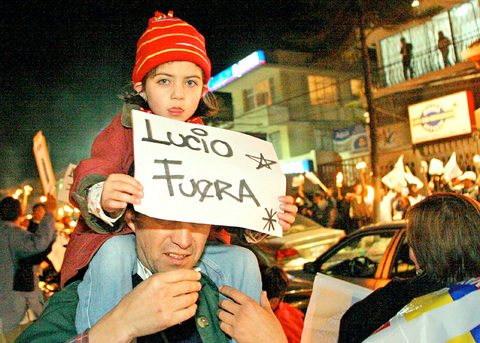Facing growing street protests demanding his ouster, President Lucio Gutierrez declared a state of emergency in the capital and dissolved the Supreme Court in an effort to resolve an escalating political crisis.
The state of emergency placed the military in charge of maintaining public order. Gutierrez, with the military high command standing behind him, announced in a televised address to the nation Friday night that under the authority provided by the Constitution, he was dismissing "the judges of the current Supreme Court designated by Congress" in December.
"The measure ... was taken because Congress until now has not resolved the matter of the current Supreme Court, which is generating national commotion and especially in the city of Quito ... which rejects the operation of the Supreme Court."

PHOTO: AFP
A state of emergency suspends individual rights, including the right to free expression and public assembly, and allows police to enter private homes without the need for search warrants. The government noted in a news release that previous governments have made use of states of emergencies frequently. It gave as an example President Sixto Duran-Ballen's 1992-1996 administration, which declared states of emergencies on 12 occasions.
Quito residents did not heed the restriction on public assembly, and within two hours of the presidential announcement, tens of thousands of people poured into the streets.
Gutierrez's political foes were quick to condemn his action.
"One stupid act is not cured by another stupid act" said Jaime Nebot, a leader of the opposition Social Christian Party who is mayor of the coastal city of Guayaquil. "All conscientious and decent Ecuadoreans want the bastard court to go, but it cannot be done by a dictatorial and illegitimate act of the president."
Quito Mayor Paco Moncayo, a retired army general and a leader of the opposition Democratic Left party, joined in condemning the measure and criticized the military high command for supporting Gutierrez's actions.
"The president can't dissolve the court. We are living in a dictatorship and this decree unmasks the dictatorship," he said. "We are calling for civil disobedience."
There was little turnout earlier this week when Gutierrez's political opponents called a giant demonstration against his purge of the Supreme Court.
But street protests began Wednesday night and increased in numbers until at least 10,000 people marched Friday night in several sections of Quito, banging pots and sticks and shouting "Get out, Lucio!"
The street protests were in response to the impromptu battle cry of a local radio station to join a nocturnal pot-banging caravan.
"We want to restore dignity and tell all of the political leaders that they are not on the same level as the people," Paco Velasco, director of the Luna radio station, told listeners Friday.
The court crisis was set in motion in November when the former justices sided with opposition politicians in a failed effort to impeach Gutierrez on corruption charges.

MONEY GRAB: People were rushing to collect bills scattered on the ground after the plane transporting money crashed, which an official said hindered rescue efforts A cargo plane carrying money on Friday crashed near Bolivia’s capital, damaging about a dozen vehicles on highway, scattering bills on the ground and leaving at least 15 people dead and others injured, an official said. Bolivian Minister of Defense Marcelo Salinas said the Hercules C-130 plane was transporting newly printed Bolivian currency when it “landed and veered off the runway” at an airport in El Alto, a city adjacent to La Paz, before ending up in a nearby field. Firefighters managed to put out the flames that engulfed the aircraft. Fire chief Pavel Tovar said at least 15 people died, but

LIKE FATHER, LIKE DAUGHTER: By showing Ju-ae’s ability to handle a weapon, the photos ‘suggest she is indeed receiving training as a successor,’ an academic said North Korea on Saturday released a rare image of leader Kim Jong-un’s teenage daughter firing a rifle at a shooting range, adding to speculation that she is being groomed as his successor. Kim’s daughter, Ju-ae, has long been seen as the next in line to rule the secretive, nuclear-armed state, and took part in a string of recent high-profile outings, including last week’s military parade marking the closing stages of North Korea’s key party congress. Pyongyang’s official Korean Central News Agency (KCNA) released a photo of Ju-ae shooting a rifle at an outdoor shooting range, peering through a rifle scope

South Korea would soon no longer be one of the few countries where Google Maps does not work properly, after its security-conscious government reversed a two-decade stance to approve the export of high-precision map data to overseas servers. The approval was made “on the condition that strict security requirements are met,” the South Korean Ministry of Land, Infrastructure and Transport said. Those conditions include blurring military and other sensitive security-related facilities, as well as restricting longitude and latitude coordinates for South Korean territory on products such as Google Maps and Google Earth, it said. The decision is expected to hurt Naver and Kakao

Australian Prime Minister Anthony Albanese yesterday said he did not take his security for granted, after he was evacuated from his residence for several hours following a bomb threat sent to a Chinese dance group. Albanese was evacuated from his Canberra residence late on Tuesday following the threat, and returned a few hours later after nothing suspicious was found. The bomb scare was among several e-mails threatening Albanese sent to a representative of Shen Yun, a classical Chinese dance troupe banned in China that is due to perform in Australia this month, a spokesperson for the group said in a statement. The e-mail